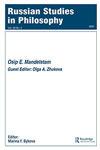列夫·卡尔萨文:俄国宗教信仰与俄国革命
IF 0.1
4区 哲学
Q4 Arts and Humanities
引用次数: 0
摘要
本文考察了俄罗斯知识分子和移民卡尔萨文(Lev Platonovich Karsavin, 1882-1952)在理解“俄国共产主义”这一具有深刻宗教性质的现象方面的独特作用。年轻的卡尔萨文是一名历史学家,专门研究欧洲宗教史、中世纪教派和异端邪说,他研究了宗教和政治交织在一起的多种方式。卡尔萨文在第一次世界大战期间成为俄罗斯东正教的活跃人物,他在具体历史文化研究方面的经验帮助他分析了俄国革命和布尔什维克主义的起源。1922年,卡尔萨文流亡国外,他继续积极发展俄国布尔什维主义的“宗教”本质这一主题,他认为从东正教的角度来看,这是未来克服布尔什维克主义的唯一途径。本文章由计算机程序翻译,如有差异,请以英文原文为准。
Lev Karsavin: Russian Religiosity and Russian Revolution
ABSTRACT This article examines the unique role of Russian intellectual and émigré Lev Platonovich Karsavin (1882–1952) in understanding “Russian communism” as a phenomenon deeply religious in nature. Trained as a historian, specializing in the history of European religiosity, medieval sects, and heresies, the young Karsavin studied the manifold ways in which religious and politics were interwoven. His experience with concrete historical–cultural research helped Karsavin, who became an active figure in Russian Orthodoxy during the First World War, to analyze the origins of the Russian Revolution and Bolshevism. Finding himself in exile in 1922, Karsavin continued actively developing the theme of the “religious” nature of Russian Bolshevism, believing that this was the only path to overcoming it in the future from an Orthodox Christian standpoint.
求助全文
通过发布文献求助,成功后即可免费获取论文全文。
去求助
来源期刊

RUSSIAN STUDIES IN PHILOSOPHY
PHILOSOPHY-
CiteScore
0.10
自引率
0.00%
发文量
14
期刊介绍:
Russian Studies in Philosophy publishes thematic issues featuring selected scholarly papers from conferences and joint research projects as well as from the leading Russian-language journals in philosophy. Thematic coverage ranges over significant theoretical topics as well as topics in the history of philosophy, both European and Russian, including issues focused on institutions, schools, and figures such as Bakhtin, Fedorov, Leontev, Losev, Rozanov, Solovev, and Zinovev.
 求助内容:
求助内容: 应助结果提醒方式:
应助结果提醒方式:


